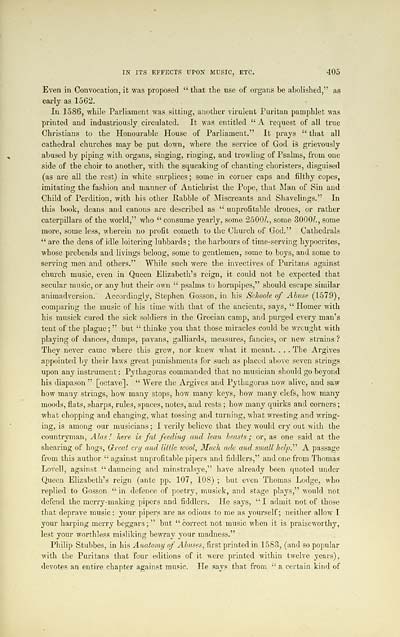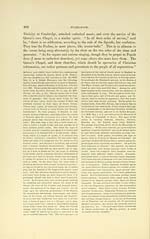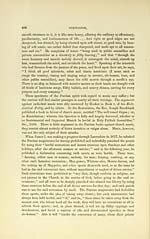Glen Collection of printed music > Printed text > Popular music of the olden time > Volume 2
(29) Page 405
Download files
Complete book:
Individual page:
Thumbnail gallery: Grid view | List view

IN ITS EFFECTS UPON MUSIC, ETC. 405
Even in Convocation, it was proposed " that the use of organs be abolished," as
early as 1562.
In 1586, while Parliament was sitting, another virulent Puritan pamphlet was
printed and industriously circulated. It was entitled " A request of all true
Christians to the Honourable House of Parliament." It prays " that all
cathedral churches may be put down, where the service of God is grievously
abused by piping with organs, singing, ringing, and trowling of Psalms, from one
side of the choir to another, with the squeaking of chanting choristers, disguised
(as are all the rest) in white surplices ; some in corner caps and filthy copes,
imitating the fashion and manner of Antichrist the Pope, that Man of Sin and
Child of Perdition, with his other Rabble of Miscreants and Shavelings." In
this book, deans and canons are described as " unprofitable drones, or rather
caterpillars of the world," who " consume yearly, some 2500/., some 3000/., some
more, some less, wherein no profit cometh to the Church of God." Cathedrals
" are the dens of idle loitering lubbards ; the harbours of time-serving hypocrites,
whose prebends and livings belong, some to gentlemen, some to boys, and some to
serving men and others." While such were the invectives of Puritans against
church music, even in Queen Elizabeth's reign, it could not be expected that
secular music, or any but their own " psalms to hornpipes," should escape similar
animadversion. Accordingly, Stephen Gosson, in his Schoole of Abuse (1579),
comparing the music of his time with that of the ancients, says, " Homer with
his musick cured the sick soldiers in the Grecian camp, and purged every man's
tent of the plague ; " but " thinke you that those miracles could be wrought with
playing of dances, dumps, pavans, galliards, measures, fancies, or new strains ?
They never came where this grew, nor knew what it meant. . . . The Argives
appointed by their laws great punishments for such as placed above seven strings
upon any instrument : Pythagoras commanded that no musician should go beyond
his diapason " [octave]. " Were the Argives and Pythagoras now alive, and saw
how many strings, how many stops, how many keys, how many clefs, how many
moods, flats, sharps, rules, spaces, notes, and rests ; how many quirks and corners;
what chopping and changing, what tossing and turning, what wresting and wring-
ing, is among our musicians: I verily believe that they would cry out with the
countryman, Alas ! here is fat feeding and lean leasts ; or, as one said at the
shearing of hogs, Great cry and little wool, Much ado and small help." A passage
from this author " against unprofitable pipers and fiddlers," and one from Thomas
Lovell, against " dauncing and minstralsye," have already been quoted under
Queen Elizabeth's reign (ante pp. 107, 108) ; but even Thomas Lodge, who
replied to Gosson " in defence of poetry, musick, and stage plays," would not
defend the merry-making pipers and fiddlers. He says, " I admit not of those
that deprave music : your pipers are as odious to me as yourself; neither allow I
your harping merry beggars;" but "correct not music when it is praiseworthy,
lest your worthless misliking bewray your madness."
Philip Stubbes, in his Anatomy of Abuses, first printed in 1583, (and so popular
with the Puritans that four editions of it were printed within twelve years),
devotes an entire chapter against music. He says that from " a certain kind of
Even in Convocation, it was proposed " that the use of organs be abolished," as
early as 1562.
In 1586, while Parliament was sitting, another virulent Puritan pamphlet was
printed and industriously circulated. It was entitled " A request of all true
Christians to the Honourable House of Parliament." It prays " that all
cathedral churches may be put down, where the service of God is grievously
abused by piping with organs, singing, ringing, and trowling of Psalms, from one
side of the choir to another, with the squeaking of chanting choristers, disguised
(as are all the rest) in white surplices ; some in corner caps and filthy copes,
imitating the fashion and manner of Antichrist the Pope, that Man of Sin and
Child of Perdition, with his other Rabble of Miscreants and Shavelings." In
this book, deans and canons are described as " unprofitable drones, or rather
caterpillars of the world," who " consume yearly, some 2500/., some 3000/., some
more, some less, wherein no profit cometh to the Church of God." Cathedrals
" are the dens of idle loitering lubbards ; the harbours of time-serving hypocrites,
whose prebends and livings belong, some to gentlemen, some to boys, and some to
serving men and others." While such were the invectives of Puritans against
church music, even in Queen Elizabeth's reign, it could not be expected that
secular music, or any but their own " psalms to hornpipes," should escape similar
animadversion. Accordingly, Stephen Gosson, in his Schoole of Abuse (1579),
comparing the music of his time with that of the ancients, says, " Homer with
his musick cured the sick soldiers in the Grecian camp, and purged every man's
tent of the plague ; " but " thinke you that those miracles could be wrought with
playing of dances, dumps, pavans, galliards, measures, fancies, or new strains ?
They never came where this grew, nor knew what it meant. . . . The Argives
appointed by their laws great punishments for such as placed above seven strings
upon any instrument : Pythagoras commanded that no musician should go beyond
his diapason " [octave]. " Were the Argives and Pythagoras now alive, and saw
how many strings, how many stops, how many keys, how many clefs, how many
moods, flats, sharps, rules, spaces, notes, and rests ; how many quirks and corners;
what chopping and changing, what tossing and turning, what wresting and wring-
ing, is among our musicians: I verily believe that they would cry out with the
countryman, Alas ! here is fat feeding and lean leasts ; or, as one said at the
shearing of hogs, Great cry and little wool, Much ado and small help." A passage
from this author " against unprofitable pipers and fiddlers," and one from Thomas
Lovell, against " dauncing and minstralsye," have already been quoted under
Queen Elizabeth's reign (ante pp. 107, 108) ; but even Thomas Lodge, who
replied to Gosson " in defence of poetry, musick, and stage plays," would not
defend the merry-making pipers and fiddlers. He says, " I admit not of those
that deprave music : your pipers are as odious to me as yourself; neither allow I
your harping merry beggars;" but "correct not music when it is praiseworthy,
lest your worthless misliking bewray your madness."
Philip Stubbes, in his Anatomy of Abuses, first printed in 1583, (and so popular
with the Puritans that four editions of it were printed within twelve years),
devotes an entire chapter against music. He says that from " a certain kind of
Set display mode to: Large image | Transcription
Images and transcriptions on this page, including medium image downloads, may be used under the Creative Commons Attribution 4.0 International Licence unless otherwise stated. ![]()
| Special collections of printed music > Glen Collection of printed music > Printed text > Popular music of the olden time > Volume 2 > (29) Page 405 |
|---|
| Permanent URL | https://digital.nls.uk/91362342 |
|---|
| Shelfmark | Glen.254a |
|---|---|
| Additional NLS resources: | |
| Attribution and copyright: |
|
| Description | Scottish songs and music of the 18th and early 19th centuries, including music for the Highland bagpipe. These are selected items from the collection of John Glen (1833 to 1904). Also includes a few manuscripts, some treatises, and other books on the subject. |
|---|
| Description | The Glen Collection and the Inglis Collection represent mainly 18th and 19th century Scottish music, including Scottish songs. The collections of Berlioz and Verdi collected by bibliographer Cecil Hopkinson contain contemporary and later editions of the works of the two composers Berlioz and Verdi. |
|---|

